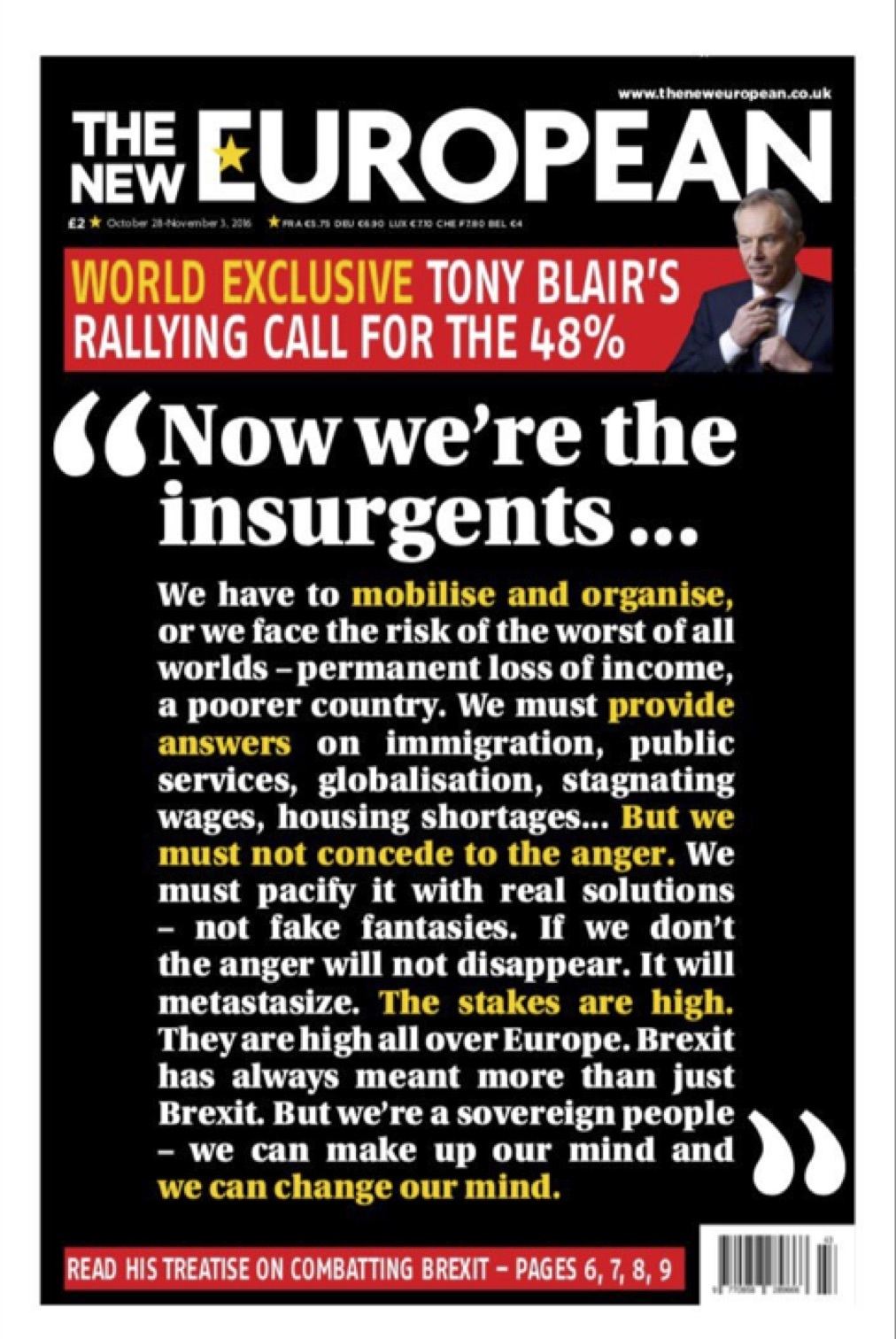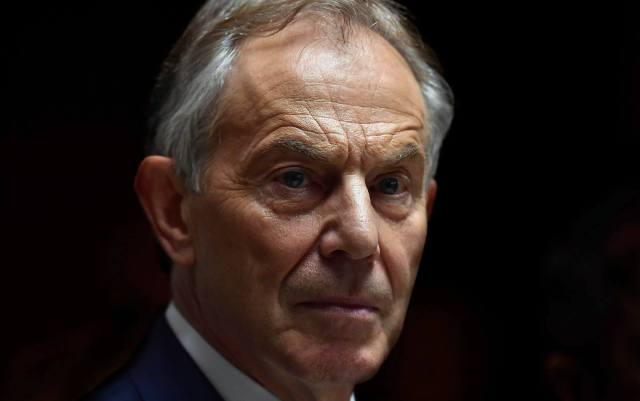Tony Blair (Photo by Charles McQuillan/Getty Images)

It feels like Tony Blair never went away. Up he popped again this week, to deliver a speech at Reform Scotland and a long interview on the Andrew Neil Show. He may have lost the cheerful radiance of his younger years, but his powers are undimmed: fleet-footed, eloquent and the quintessence of reasonableness.
His choice of language is always the same — “advocating the sensible solution” of a second referendum, and ending his speech in Scotland with a rousing peroration on the virtue of the centre ground:
“Politics must renew its core strength. Its centre. A place of reason. A place of maximum agreement and respectful disagreement. The place where radical change is pursued but of the practical and sensible kind, the kind which works.”
It sounds unarguable. Pure common sense. And I have no doubt that Mr Blair genuinely believes that he still represents this sort of politics — the pragmatist, the healing unifier between extremist poles.
But it’s just not true. If he ever was that person, he is not any more. Step back and take note of what he has accomplished over the past three years and you soon realise he has become something very different.
Since the EU Referendum, Tony Blair has behaved as a radical. He has deployed his formidable political powers to convince the centre and Left of British politics to rethink their initial acceptance of the result and suppress their instinct to compromise. More than anything else, this shift explains why political and public opinion is now irreconcilably divided; more than anyone else, it’s thanks to him. Whether or not his campaign to reverse the referendum result is ultimately successful, his all-or-nothing approach pushed the country away from the centre ground and into two irreconcilable poles.
The only unifying route after the vote to leave was a compromise Brexit deal that the centrist elements of both main parties could support; this was the natural place for Tony Blair, the master of ‘triangulation’. Had he pointed his powers towards that outcome, instead of radicalising the centre-Left, a version of Theresa May’s deal might long since have passed. The country might be coming together by now.
Instead, he set about a meticulous campaign to move people away from the “place of maximum agreement and respectful disagreement” he talks so lyrically about. Even if a last minute Brexit deal now emerges, his campaign has ensured that it will never be seen as satisfactory.
Looking back at media clips of Blair’s reaction in the initial days after the referendum in June 2016 is an eerie experience. In those first days, no-one knew how it was going to play out — but country and parliament alike broadly accepted that Britain would leave the European Union.
I spent 12 hours on Brexit night commentating on CNN, and as the result became clear, a succession of politicians surfaced to offer dire predictions or expressions of hope. Not a single one suggested that Brexit would not happen.
Except Mr Blair.
The day after the referendum result, on BBC, he urged caution: “I don’t think we should take any rash decisions at the moment … we’ve got to reflect, we’ve got to unite and we’ve got to chart a way forward.” That same phrase “chart a way forward” returns in many of those initial interviews, but nowhere does he say that Britain will actually leave the EU. The people have spoken, he said, and we have to “take account of that” — but he never says, explicitly, that the decision must be enacted.
Three days later, on 28 June, in America on MSNBC Morning Joe, he’s more to the point:
“The one thing I would just say is, there’s a lot that is going to play out in the next weeks and months. We are masters of our own destiny… I wouldn’t write us out of Europe yet.”
In the context, his composure and foresight are staggering. Right from those early days, when all around him the world had accepted the result as a fact, he already had a plan.
He waited until later in 2016 to formally launch his campaign to reverse the referendum. He gave an interview to the New European (editor-at-large, Alastair Campbell) announcing that “we’re now the insurgents” and that we have to “mobilise and organise” to make people change their minds.
 It may seem commonplace now, but back then, this was seen as a revolutionary move. Even the Guardian was uncertain: “Tony Blair’s call to mobilise against Brexit sparks mixed response”, it reported. This intervention first made the idea of a “counter-insurgency” politically acceptable.
It may seem commonplace now, but back then, this was seen as a revolutionary move. Even the Guardian was uncertain: “Tony Blair’s call to mobilise against Brexit sparks mixed response”, it reported. This intervention first made the idea of a “counter-insurgency” politically acceptable.
On 1 February 2017, the House of Commons voted to trigger Article 50 by 498 votes to 114, supported by more than 75% of Labour MPs. The BBC’s Laura Kuenssberg wrote an analysis entitled “Past the Point of no-return” in which she concluded, “tonight, for better or worse, few will believe that our journey to the exit door can be halted …the moment for turning back is past.”
Just two weeks later, on 17 February, Tony Blair gave a speech at Bloomberg in which he railed against this spirit of acceptance, saying that people had a right to change their mind and that “our mission is to persuade them to do so”.
The following month, he met EU negotiator Michel Barnier in person and pushed for an extension — just one of countless meetings with political leaders from the EU and the UK across the period. By February 2018, he estimated that the chances of “stopping Brexit” had increased to 50%.
Fast forward another year, to January 2019, and he told European leaders (correctly, once again) that May’s government would not opt for no deal, and that if they held firm and refused to compromise, she would be forced to opt for an extension. Throughout, he overtly denigrated the idea of a ‘third way’ compromise as illogical and insisted that the only options that made sense were no-deal Brexit or no Brexit at all.
Every time there was about to be a moment of agreement, he has been there, agitating against it. One by one, Left-leaning and centrist politicians and campaigners moved away from hoping for a soft Brexit and towards the idea that the whole thing could be cancelled. This was Tony Blair’s masterplan, and he executed it with aplomb.
The consequences of this historic pivot against compromise are still being felt: it not only scuppered Theresa May’s Brexit deal (which two years previously most Labour MPs would have been delighted with), it has greatly added to divisions in the country, perhaps for a generation. Whichever side finally triumphs, we can be certain that one half of the population will now feel bitterly defeated.
So next time the high-priest of reasonableness pops up on your television screen, remember this: on Brexit, his legacy has been to destroy the very “sensible centre” that he still fancifully calls his own.










Join the discussion
Join like minded readers that support our journalism by becoming a paid subscriber
To join the discussion in the comments, become a paid subscriber.
Join like minded readers that support our journalism, read unlimited articles and enjoy other subscriber-only benefits.
Subscribe